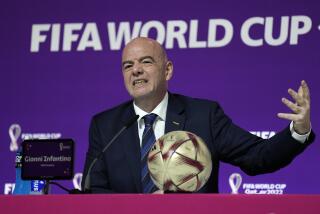Blatter Is Reelected in a Landslide
- Share via
SEOUL — It was an African delegate from Kenya who spoke for all of international soccer’s smaller and less powerful federations Wednesday when he said they felt as if they were “dancing with elephants.”
And it was an African candidate who was crushed in that dangerous dance when Issa Hayatou of Cameroon was soundly defeated by incumbent Joseph “Sepp” Blatter of Switzerland in what had been a bitter and acrimonious battle for the presidency of FIFA, world soccer’s governing body.
Despite claims of corruption and cronyism, bribery and financial mismanagement that have been leveled against him over the last few months, Blatter won with astonishing ease.
Of FIFA’s 204 member nations, 197 were eligible to vote at the 53rd FIFA Congress, and Blatter swept to a first-ballot victory, 139-56, with two votes declared void.
The election signals an end to one of the most turbulent periods in FIFA’s 98-year history, but the fact that Blatter, a 66-year-old former Swiss Army colonel, sportswriter and public relations executive, has held onto the position he won four years ago will not make the problems disappear.
Scandal and rumors of scandal have surrounded FIFA for more than three decades. Brazilian Joao Havelange, Blatter’s predecessor and mentor and the man who ruled FIFA for 24 years as if it were his personal fiefdom, hovered around the fringes of the election like the ghost of Christmas past.
When it was all over, the 88-year-old Havelange was one of a parade of figures, including longtime allies Julio Grondona of Argentina and Chuck Blazer of the United States, who embraced Blatter and congratulated him on surviving the verbal knife-fight that had preceded the election.
At issue has been the state of FIFA’s finances, and whether Blatter has mortgaged the future of the organization by borrowing from anticipated income from the 2006 World Cup in Germany to meet the bills of today.
“Robbing Peter to pay Paul,” is how the president of Ireland’s soccer federation put it.
Opponents, especially FIFA vice presidents Lennart Johansson of Sweden and Chung Mong-joon of South Korea, claimed FIFA is hundreds of millions of dollars in debt, and also suggested that Blatter had used FIFA development programs and the $250,000 it annually gives to each of its 204 member nations as a way of buying votes.
Blatter consistently denied any wrongdoing, claiming that the charges were a political smear campaign aimed at ousting him from the presidency.
Matters reached a head on May 3 when Michel Zen-Ruffinen of Switzerland, a former Blatter protege and the man who succeeded him as FIFA’s secretary general, delivered a scathing report that hinted that Blatter might have broken Swiss law in his mishandling of FIFA finances.
Eleven members of FIFA’s executive committee subsequently asked Blatter to resign and, when he did not, they turned the Zen-Ruffinen documents over to Swiss prosecutors to determine whether any laws had been broken. The outcome of that action is pending.
After Blatter’s victory Wednesday, Zen-Ruffinen’s position appeared precarious in the extreme and he acknowledged that he could lose his job.
“I won’t resign, I have nothing to be ashamed of,” Zen-Ruffinen said.
Blatter almost certainly will have other ideas.
“If he says he is in trouble, then he is in trouble,” Blatter said ominously, adding that in his second four-year term he would “be a bit more prudent in the choice of people who have to work directly with me.”
Switching with ease between English, French, German and Spanish, Blatter thanked the Congress for voting for him and promised to work for unity.
“One must be practical to be FIFA president,” he said, “but I am emotional today because after months of certain newspapers being directed to say what a bad man I am, you have once again given me your trust. If it means I am now a good man, then you are good men also.”
The task of reuniting FIFA will not be easy, if it is possible at all.
Unlike the United States, which supported Blatter’s reelection, England opposed it, and, in a powerful pre-vote speech Wednesday, Adam Crozier, chief executive of the English Football Assn., explained why.
“Realistically, FIFA has lost 470 million Swiss francs [$320 million] over the last four years,” Crozier said. “Realistically, FIFA has negative equity of 430 million Swiss francs [$300 million].
“One thing is certain, it is not good news and it will get worse.”
If the FIFA finances are in the disarray that is claimed, it could put into jeopardy such events as the FIFA Women’s World Cup and the FIFA Confederations Cup, both scheduled for next year. The FIFA World Club Championship, postponed last year because of lack of funds, could disappear altogether.
Blatter’s election victory is not the finale, merely the prelude. The “dancing with elephants” will continue.
*
(BEGIN TEXT OF INFOBOX)
FIFA’s Presidents
*--* * Robert Guerin France 1904-06 * Daniel Burley Woolfall England 1906-18 * Jules Rimet France 1921-54 * Rodolphe William Seeldrayers Belgium 1954-55 * Arthur Drewry England 1955-61 * Sir Stanley Rous England 1961-74 * Joao Havelange Brazil 1974-98 * Joseph Blatter Switzerland 1998-Present
*--*
More to Read
Go beyond the scoreboard
Get the latest on L.A.'s teams in the daily Sports Report newsletter.
You may occasionally receive promotional content from the Los Angeles Times.







